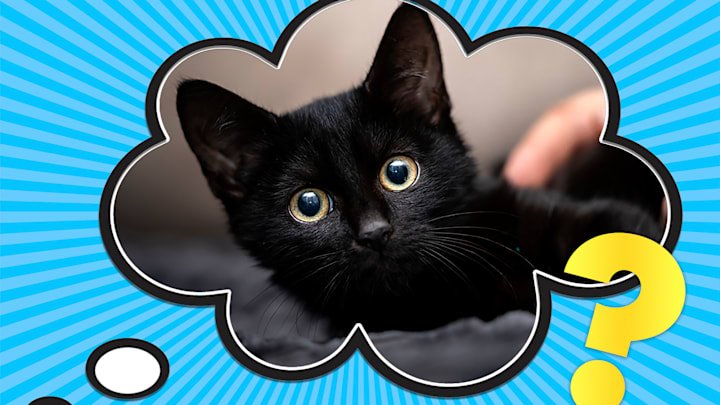Feline friends and fans know there’s nothing to fear, but the persistence of the belief that black cats are somehow bad luck has endured for centuries. Sure, during the heyday of ancient Egypt, all cats were honored and worshipped—killing one was even capital crime—but the rise of witchcraft in Europe put the kibosh on any trace of goodwill toward the inkiest of felines.
While black pigmentation isn’t limited to specific breeds (in fact, the Cat Fanciers’ Association lists “solid black” as a color option for 22 breeds), the Bombay breed is likely the kind of cat you picture most often when you imagine a classic black cat. Most black cats also come with golden yellow eyes, thanks to the high melanin pigment content in their bodies. And though all-black cats can be either male or female, there’s a slightly higher prevalence of the coloration in male cats.
Black cats pop up frequently in all sorts of culturally based bits of folklore, and though many black cat myths are actually of the positive variety, Western tradition has so maligned the critters that black cats as bad luck have become something of a given in various circles (at least, that’s what it looks like once Halloween decorations start popping up, “scaredy cats” and all). So are black cats bad luck? We’ll uncover more down below.
Bad Luck for Black Cats
It seems that the association between bad luck and black cats dates all the way back to the 13th century. It’s not known exactly how and why cats became associated with the devil in the Middle Ages, but the belief was so persistent that they were rounded up and killed during the Black Death pandemic around 1348 CE. Ironically, culling the cats only worsened the plague, which was often spread by infected fleas attached to rodents.
As chatter about nefarious witchcraft began to spread around Europe in the 16th century, cats (particularly black ones) found themselves tangled up in the hunt, simply because many presumed witches had taken in alley cats as companions. Somehow, the concept of “companion” turned into “familiar,” and the belief that witches could turn themselves into their (typically black) cat companions became a persistent one, even carrying over to America, where it was an indelible part of the Salem Witch Trials.

It didn’t help matters that the Puritans who helped populate Salem, Massachusetts, were devout Bible believers, and the combination of a major fear of anything devil-related (dating back to the Middle Ages) and the lingering belief that black cats were a classic part of witch lifestyles was a lethal one.
Black Cats in Folklore
There are plenty of black cat myths throughout history. Scottish folklore includes a fairy known as the Cat Sìth, a giant black cat (with a small white spot on his chest) who was believed to have the ability to steal a dead person’s soul before the gods could claim it. That belief led to the creation of night-and-day watches called the “Late Wake” to guard bodies just before burial. Scottish people also employed such tried-and-true methods as “using catnip” and “jumping around a lot” to scare off potential Cat Sìth soul-stealers.
There’s also plenty of folklore and legend associated with the actual movements of black cats. In many of the European countries where the felines are still seen as bad luck, it’s an extra-bad omen when a black cat actually crosses your path.
However, German folks seem to have lightened up this piece of legend, believing that a cat that crosses from right to left is bad news, while one that moves left to right is fine. Good luck trying to get a cat to move the way you want them to; as any cat owner knows, you’ll already need good fortune, skill, and a whole lot of patience to get any kind of cat (black or not) to follow direction as related to paw placement.

Superstitious gamblers also adhere to the cross-path bad news brigade—if a black cat crosses a gambler’s path while they are heading out to gamble, they are meant to turn back.
Even some pirates subscribed to movement-based beliefs, holding fast to the idea that if a black cat moves toward you, that’s bad luck, but a cat moving away from you means good news. If a black cat walked onto a ship and then walked off, the ship would sink on its next outing.
Black Cats as Good Luck
It does seem that the influence of ancient Egyptians and their love for cats held over in some European cultures. Sailors and their wives believed in the good luck power of the black cat, with some fishermen keeping such cats on board while women kept black cats at home for a double dose of fortune.
Japanese culture also honors black cats as symbols of good luck, and they are viewed as particularly important to single women, as having a black cat is believed to lure in many fine suitors. In Russia, all cats are viewed as lucky.

Plenty of black cat imagery shows its whiskers during Halloween. You can also honor the animals each summer by celebrating “Black Cat Appreciation Day” every August 17.
Have you got a Big Question you’d like us to answer? If so, let us know by emailing us at bigquestions@mentalfloss.com.
A version of this story originally ran in 2013; it has been updated for 2024.
